The Relationship between Stress and Incidence of Sleep Disorder among Students at the Faculty of Medicine Universitas Sumatera Utara
DOI:
https://doi.org/10.32734/sumej.v5i2.7988Keywords:
Sleep Disorder, Stress, Undergraduate StudentsAbstract
Abstract. Stress is a non-specific response of the body to any form of changes. Stress is generally considered synonymous with distress. Long study duration and high academic achievement targets have the potential to cause stress in medical students. Prolonged stress can cause sleep disturbances in a person. Sleep disorders are a group of conditions that can disrupt sleep patterns. Objective. The purpose of this study was to determine the effect of stress on sleep disorders in undergraduate students at the Faculty of Medicine, Universitas Sumatera Utara. Methods. This research is an analytic study with a cross-sectional design. Respondents are undergraduate students at the Faculty of Medicine, University of North Sumatra, class of 2018-2021. Data was obtained through a questionnaire instrument. Results. Of the 103 respondents, 58 (56.3%) reported experiencing stressful events with sleep disturbances. Conclusion. There was a significant relationship (P = 0.047) between stress and sleep disorders in students at the Faculty of Medicine, University of North Sumatra. In majority, the type of their sleep disorder are nightmares.
Downloads
References
Mental Health Foundation, “stress ?,†Bulletin of the Royal College of Psychiatrists, 2020. https://www.mentalhealth.org.uk/a-to-z/s/stress (accessed Mar. 29, 2021).
Kemenkes RI, “Laporan Provinsi Jawa Tengah Riskesdas 2018,†Kementerian Kesehatan RI, 2019. http://ejournal2.litbang.kemkes.go.id/index.php/lpb/article/view/3641 (accessed Feb. 10, 2021).
A. Agusmar, V. AT, and S. Wahyuni, “Perbandingan Tingkat Stres pada Mahasiswa Angkatan 2018 dengan Angkatan 2015 Fakultas Kedokteran Universitas Baiturrahmah,†Heal. Med. J., vol. 1, no. 2, pp. 34–38, 2019, doi: 10.33854/heme.v1i2.238.
S. dwi Putri, “Hubungan Tingkat Stres Dengan Kualitas Tidur Pada Mahasiswa Semester VII Fakultas Kedokteran Universitas Sumatera Utara Tahun 2016,†Universitas Sumatera Utara, 2016.
widya rizkina Choir, “Hubungan Tingkat Stres Dan Kualitas Tidur Pada Mahasiswa Kedokteran Dan Mahasiswa Akuntansi Skripsi,†Universitas Sumatera Utara, 2018.
Deldar Morad Abdulah & Rasoul Sabri piro., “Sleep disorders as primary and secondary factors in relation with daily functioning in medical students,†Ann. Saudi Med., vol. 38, no. 1, pp. 537–544, 2018, doi: 10.5144/0256-4947.2018.537.
L. Sherwood, Textbook of Human Physiology, 8th ed., vol. 1, no. 5277. Amerika Serikat: Yolanda Cossio, 2014.
D. A. Kalmbach, J. R. Anderson, and D. &Christopher L., “The impact of stress on sleep: Pathogenic sleep reactivity as a vulnerability to insomnia and circadian disorders,†J. Sleep Res., vol. 27, no. 6, 2018, doi: 10.1111/jsr.12710.
Musradinur, “Stres Dan Cara Mengatasinya Dalam Perspektif Psikologi,†J. Edukasi, vol. 2, no. 2, p. 183, 2016, doi: 10.22373/je.v2i2.815.
T. O. Ratnaningtyas and D. Fitriani, “Hubungan Stres dengan Kualitas Tidur pada Mahasiswa Tingkat Akhir,†Edu Masda J., vol. 3, no. 2, pp. 181–191, 2019.
kimscott e. Barret, B. Scote, L. brooks Heddwen, and susan M. Barman, Ganong Buku Ajar Fisiologi Kedokteran Fisiologi Kedokteran Ganong, 24th ed. New York, America, 2012.
S. A. Anita, A. Friedrich, and M. Claßen, “Sleep problems in university students,†Neuropsychiatr. Dis. Treat., pp. 1989–2001, 2017, [Online]. Available: http://dx.doi.org/10.2147/NDT.S142067.
Downloads
Published
How to Cite
Issue
Section
License
Copyright (c) 2022 Sumatera Medical Journal

This work is licensed under a Creative Commons Attribution-NonCommercial-NoDerivatives 4.0 International License.
The Authors submitting a manuscript do so on the understanding that if accepted for publication, copyright of the article shall be assigned to Sumatera Medical Journal (SUMEJ) and Faculty of Medicine as well as TALENTA Publisher Universitas Sumatera Utara as publisher of the journal.
Copyright encompasses exclusive rights to reproduce and deliver the article in all form and media. The reproduction of any part of this journal, its storage in databases and its transmission by any form or media, will be allowed only with a written permission from Sumatera Medical Journal (SUMEJ).
The Copyright Transfer Form can be downloaded here.
The copyright form should be signed originally and sent to the Editorial Office in the form of original mail or scanned document.











